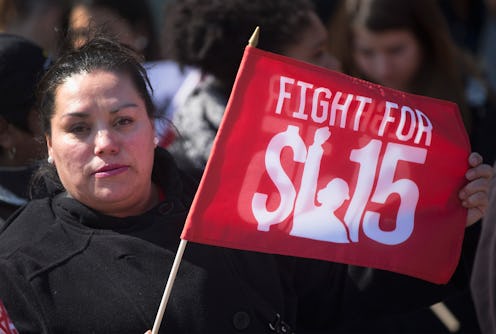News
The Minimum Wage Is Going Up In 21 States In 2017

In November, union activists organized strikes at airports across the country demanding wage increases to $15 an hour. Workers at fast food establishments and home healthcare workers joined in too. They want union rights and what proponents call a living wage, which in some jurisdictions including at Seattle-Tacoma International Airport, has been put in place through minimum wage laws. Many states and jurisdictions around the country have increased their minimum as a result of pressure from these sorts of protests. So if you're wondering, is the minimum wage going up in my state? There's a pretty good chance that it is.
According to CNN, 21 states around the country will see an increase starting at the beginning of 2017. That's 42 percent of the country and about 4.4 million low wage workers, according to a study by the Economic Policy Institute, The Wall Street Journal reported. The typical, more liberal states like California, New York, and Massachusetts are all on the list, but there are also places that voted for Donald Trump like Arkansas, South Dakota, and Alaska.
David Cooper, an analyst at the Economic Policy Institute, told The Journal that in a way that makes sense because part of the reason people voted for Trump was frustration around salaries. "Some of what Trump tapped into was people wanting to be paid more," Cooper told the paper. “Voting for a minimum-wage increase is one of the ways to make that happen for a lot people."
According to the Associated Press, Massachusetts and Washington state will have the highest minimum wages in the country at $11 an hour. In California it will be $10.50 for employees at companies with more than 25 employees, and in New York it will depend on where you are. New York City will also see $11 but just $10.50 for employees of small businesses. The suburbs will have a $10 wage and upstate will be just $9.70.
Bernie Sanders and other Dems have been tweeting about minimum wages around the holidays. The Vermont senator, who is a proponent of a $15 minimum, wrote, "There is not a single state where working 40 hours/week at the minimum wage is enough to afford a one-bedroom apartment. That's an outrage!" Even the states with the best minimum wage to cost of living ratio require 60 hours a week according to Sanders' estimates.
The Democratic senator-elect from California, Kamala Harris, also posted about the minimum wage, criticizing the federal level. She wants to raise it and tie the new wage to inflation. That's already how some states do it. Alaska, Florida, Missouri, Montana, New Jersey, Ohio, and South Dakota all raise their wages based on an inflation index.
While the wage won't reach $15 in any of the nation's 50 states, these slight increases are a step in the right direction. The federal minimum hasn't been raised since 2009, and thanks to inflation is worth less today than when it was passed, according to the Department of Labor. So if you live in a state where it won't be going up, consider writing your lawmakers and let them know how you feel on the issue.